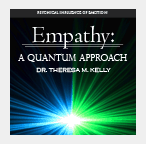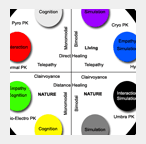Empathy
Parapsychology Articles, Papers and Books
Home > Articles > Psychical Phenomena > Extrasensory Perception > Empathy
![]()
|
| NEWSLETTERS |
| Get the best from QPsychics.com in your inbox! |
|
| PARAPSYCHOLOGY ORGANIZATIONS |
"With confidence in the importance of utilizing the investigative mode of the established sciences in order to inquire into the authenticity and to potentially explain the nature of psychical phenomena."  |
 |
 |
 |
 |
Empathic Applications in Group Psychotherapy
Empathy is the psychical influence of emotion via experient influence over the emotional basis of consciousness and the mental and physiological processes associated with a wide variety of emotional experiences. Group psychotherapy is an ideal therapeutic application for all types of empathists because they primarily work at the collective level. Group psychotherapy involves one or more therapists treating a small group of clients or patients together as a whole. Basically, group psychotherapy applies to any form of psychotherapy delivered in a group format including group cognitive-behavioral therapy, though typically it is applied to psychodynamic group therapy, where the group context and process is explicitly utilized as a mechanism of change by developing, exploring, and examining interpersonal relationships within the group. Types of group therapy include any assisting process in which takes place in a group such as: support groups, skills training groups (e.g. anger management, mindfulness, relaxation training or social skills training), and psycho-education groups. Specialized forms of group therapy can include non-verbal therapies such as; expressive therapies (e.g. dance therapy and music therapy). Therapeutic factors associated with group psychotherapy and practice include universality, altruism, instillation of hope, imparting information, corrective recapitulation of the primary family experience, development of socializing techniques, imitative behavior, cohesiveness, existential factors, catharsis, interpersonal learning, and self-understanding. Regardless of the factor, a skilled empathic simulator can assist via psychically sharing emotional information to help group members achieve goals of understanding and being understood, and achieve goals of altering one’s emotions and therefore thoughts, feelings, and behaviors for the individuals and or the group’s benefit and well-being.
(Adapted from the book “Empathy: A Quantum Approach - The Psychical Influence of Emotion” by Theresa M. Kelly, MsD.)
|
|||
Related Articles |
|||

